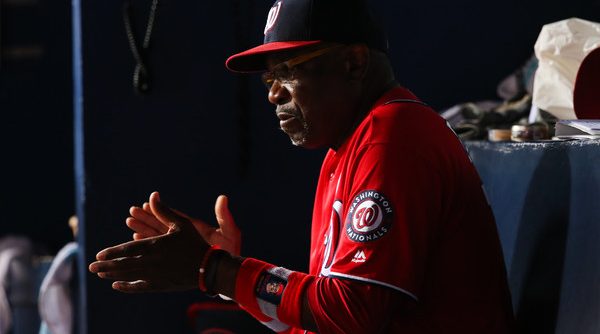The resumé of Dusty Baker is one that elicits sharp debate. Depending upon one’s interpretation, he’s either an under-appreciated leader with over 1,700 wins and an impeccable ability for handling a clubhouse, or he’s notoriously prone to bad in-game decisions and just happens to be in the right places at the right time.
In truth, the answer lies somewhere in the middle. Baker can handle the toughest of clubhouses, but has been extremely fallible throughout his career. A portion of the criticism stems from his postseason experience, as, in seven trips he has advanced beyond the first round just twice, and oversaw memorable collapses for the San Francisco Giants (Game 6, 2002 World Series) and the Chicago Cubs (2003 NLCS).
For someone who just three years ago seemed unlikely to get a shot at redemption, Baker has had a nice year for the Washington Nationals. Despite injuries to the rotation, a bullpen that spent more than half the season in flux, and early lineup issues, the Nationals are set to capture their third NL East title in five seasons. If the Nationals gain that elusive postseason series win, should it prompt a reevaluation of Baker’s role as a manager?
Too often flat views of managers — essentially that their skill sets never improve year over year — persist, even as today’s landscape provides examples to the contrary. For every manager that falls flat in repeated tries, there are those who learn how to best leverage the advantages given to the. Ned Yost has aptly handled Kansas City’s bullpen, Clint Hurdle’s embrace of sabermetrics helped turnaround Pittsburgh, and Buck Showalter has helped build a perennial contender in Baltimore off the strength of bullpens and power lineups.
For Baker, his success arguably comes from flexibility. He has taken advantage of an organization will to do things like playing Trea Turner in centerfield despite limited experience, and made it work at the major league level. He has been willing to throw Koda Glover into tough situations despite limited chances, and stood by struggling players (for better or worse).
Simply put, Baker has probably done what can be expected of a manager this year. He has worked with his advantages, worked around his disadvantages, and turned around a team that underperformed a year ago.
Ultimately, one of the factors that will spark the conversation of whether to reassess Baker is how the Nationals perform this year. Should the team advance beyond the first round for the first time, Baker will be able to do something that no manager in the team’s history has done before. If he can do so in what might be one of the NL’s most competitive postseason slates in recent memory, that will bode even better. Another factor is the future. If this is finally the year in which the Nationals begin a string of consecutive postseason runs, Baker will have outdone his predecessors by actually building upon the team’s promise on a year-over-year basis.
What Baker has accomplished for the Nationals has amounted to a nice comeback story. Come October, he will have a chance to reshape his image as a manager.
Tags: Dusty Baker, Nationals, Nats, Washington Nationals




Leave a Reply